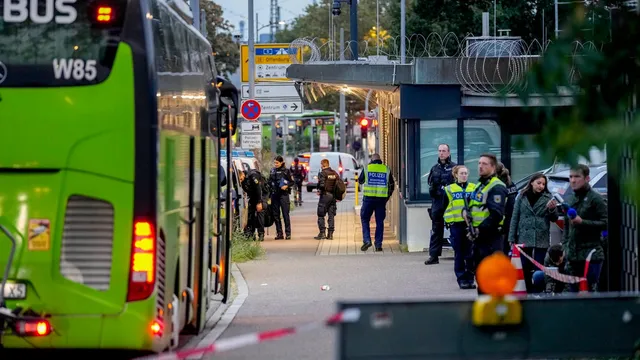
EU nations protest against UK-France migration deal
2025-07-01 11:35- Five EU countries raised concerns over the proposed UK-France migration agreement.
- The countries fear the deal may burden their already strained asylum systems.
- The European Commission is mediating amidst objections, reflecting ongoing tensions in EU migration governance.
Express your sentiment!
Insights
In recent developments, five EU nations—Italy, Greece, Spain, Malta, and Cyprus—have expressed serious concerns about a proposed immigration agreement between France and the United Kingdom. This deal, known as the 'one in, one out' policy, aims to facilitate the return of asylum seekers to France in exchange for the UK accommodating those with family ties in the country. The participating nations have criticized this arrangement, indicating that it could result in asylum seekers being sent back to their shores, which they believe may burden already strained reception facilities. Furthermore, these countries have formally communicated their objections to the European Commission, highlighting that this unilateral move by France raises procedural concerns and potential implications for other EU member states, particularly those that serve as initial entry points for migrants. The ongoing tensions underscore a long-standing grievance among southern European nations regarding the governance of irregular migration within the continent. Following the migrant crisis of 2015 and 2016, nations like Italy and Greece have felt increasingly abandoned by northern counterparts, who they feel have been indifferent to their challenges. Historically, the Dublin regulation allowed asylum seekers to be returned to the first European country they entered, perpetuating stress on these southern states while wealthier northern nations benefitted from a more favorable reception of migrants. The perception that northern Europe has been neglectful during crises has fueled political discontent in Italy and Greece, as they argue for more equitable responsibility sharing in managing migration. Now, with the proposed UK-France deal, fears have intensified that such arrangements may exacerbate the existing disparity. Not only do Italy, Greece, Spain, Malta, and Cyprus oppose the deal in principle, they are also concerned that it may lead to an influx of returned migrants, pushing their already strained systems to the brink. The European Commission's intervention to mediate reflects the delicate balance that exists in EU policymaking surrounding migration issues and the need to ensure that all member states are adequately involved in discussions that could significantly affect them. These events are emblematic of deep-rooted divisions between EU countries regarding how to approach irregular migration and represent ongoing attempts by leaders like French President Emmanuel Macron and UK Prime Minister Keir Starmer to navigate a politically charged landscape. In light of these tensions, it is likely that any agreements resulting from the summit of the UK and France in early July must address the concerns raised by their EU counterparts comprehensively. Resolution will require careful negotiations, as member states voice their unease about unilateral deals undermining collaborative frameworks deterred by past crises. As such, the proposed arrangement will be closely scrutinized and could have implications for future EU migration policies, showing just how challenging and multifaceted migration governance is within the union.
Contexts
The European Union (EU) migration policy has undergone significant transformations over the years, shaped by a combination of humanitarian, economic, and political factors. As of 2025, the EU has established a comprehensive framework aimed at managing migration effectively while upholding the fundamental rights of migrants and refugees. Central to this is the Common European Asylum System (CEAS), which seeks to harmonize asylum procedures across member states, ensuring that individuals fleeing conflict or persecution can access protection in a fair and efficient manner. The EU has also recognized the urgent need to respond to the repercussions of global crises, such as climate change and armed conflicts, which continue to drive migration flows into Europe from various regions, particularly the Middle East and Africa. In recent years, the EU has prioritized the implementation of border management initiatives, exemplified by the establishment of Frontex, the European Border and Coast Guard Agency. This agency plays a crucial role in safeguarding EU external borders while facilitating the safe and orderly entry of migrants. Enhanced cooperation and shared responsibility among member states have been promoted to address the challenges of irregular migration, which has included initiatives for the resettlement of refugees and the negotiation of agreements with third countries to manage migration flows. Despite these efforts, member states have faced challenges in reaching consensus on a unified approach to migration, reflecting varying political landscapes and public sentiment toward migration across different countries. Public sentiment and political debates surrounding migration have also shaped EU policies. Some member states have embraced a more welcoming stance toward migrants, emphasizing humanitarian values and the need to support those in distress, while others have expressed concerns over security, integration, and the socio-economic impact of large-scale migration. The EU has responded to these concerns by fostering dialogue and cooperation among states, focusing on integration policies that promote the social and economic contributions of migrants to their host communities. This is particularly relevant in light of aging populations in many EU countries, where migrants are viewed as essential to sustaining labor markets and economic growth. As of 2025, the EU continues to grapple with the challenges of balancing migration control with humanitarian responsibilities. The demand for a more resilient and comprehensive migration strategy remains imperative as global events unfold. Forward-looking policies that address root causes, support integration, and foster cooperation among member states while ensuring respect for human rights are critical to the future of EU migration policy. The upcoming discussions on revising and reinforcing the migration and asylum framework will be pivotal in determining how effectively the EU can address both current and future migration trends.